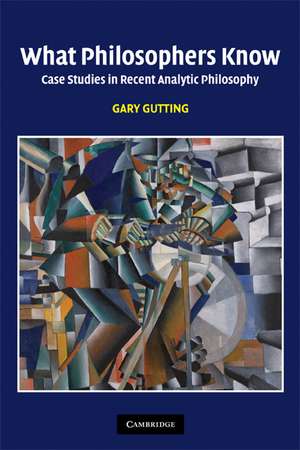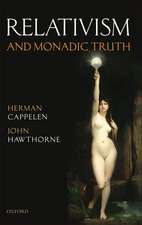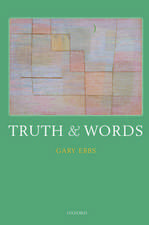What Philosophers Know: Case Studies in Recent Analytic Philosophy
Autor Gary Guttingen Limba Engleză Paperback – apr 2009
| Toate formatele și edițiile | Preț | Express |
|---|---|---|
| Paperback (1) | 224.24 lei 6-8 săpt. | |
| Cambridge University Press – apr 2009 | 224.24 lei 6-8 săpt. | |
| Hardback (1) | 392.11 lei 6-8 săpt. | |
| Cambridge University Press – apr 2009 | 392.11 lei 6-8 săpt. |
Preț: 224.24 lei
Nou
Puncte Express: 336
Preț estimativ în valută:
42.91€ • 44.80$ • 35.51£
42.91€ • 44.80$ • 35.51£
Carte tipărită la comandă
Livrare economică 04-18 aprilie
Preluare comenzi: 021 569.72.76
Specificații
ISBN-13: 9780521672221
ISBN-10: 0521672228
Pagini: 264
Dimensiuni: 152 x 228 x 14 mm
Greutate: 0.41 kg
Editura: Cambridge University Press
Colecția Cambridge University Press
Locul publicării:Cambridge, United Kingdom
ISBN-10: 0521672228
Pagini: 264
Dimensiuni: 152 x 228 x 14 mm
Greutate: 0.41 kg
Editura: Cambridge University Press
Colecția Cambridge University Press
Locul publicării:Cambridge, United Kingdom
Cuprins
Introduction; Part I. How Does That Go? The Limits of Philosophical Argument: 1. Quine's 'Two Dogmas': argument or imagination?; 2. Argument and intuition in Kripke's Naming and Necessity; 3. The rise and fall of counterexamples: Gettier, Goldman, and Lewis; 4. Reflection: pictures, intuitions, and philosophical knowledge; Part II. Arguments and Convictions: 5. Turning the tables: Plantinga and the rise of the philosophy of religion; 6. Materialism and compatibilism: two dogmas of analytic philosophy?; 7. Was there a Kuhnian revolution? Convictions in the philosophy of science; 8. Conviction and argument in Rawls' A Theory of Justice; Part III. Philosophical Truth and Knowledge: 9. Rorty against the world: philosophy, truth, and objectivity; 10. Philosophical knowledge: summary and application; References.
Recenzii
'This series of case studies of problems and advances in philosophical thinking argues effectively that philosophy can make progress and that philosophers do have distinctive substantial knowledge. The treatment is excellent: sophisticated and of interest to experts while also clearly-written and engaging for readers generally.' David Sosa, University of Texas at Austin
Notă biografică
Descriere
Drawing upon the work of Quine, Rawls, Rorty and others, Gutting challenges the standard view about what philosophers have achieved.

















